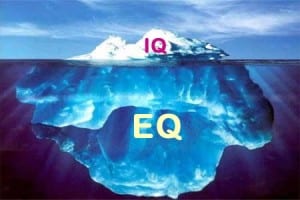How Emotional Intelligence Helps

We’re social creatures, and the life best lived often depends on our ability to create and maintain healthy relationships. Success, happiness, and the ability to give and receive love all hinge on our relationship skills. Most of us do a good job with relationships at the start. But why do we so often stumble down the road? Why do relationships develop into such stressful problems? Can emotional intelligence help?
Emotions are the building blocks of each relationship in our lives, and the power of those emotions cannot be overstated. Runaway emotions can override our thoughts and profoundly influence our behavior. Emotional intelligence (EQ) is the ability to recognize, control, and effectively communicate our own emotions, and to recognize the emotions of other people. Emotional intelligence skills enable us to use emotional building blocks to construct a solid foundation for communication. Well-developed emotional intelligence is a better predictor of success in all areas of life (and particularly in relationships) than the traditional measurement of high cognitive intelligence, or IQ.
At the foundation for all verbal and nonverbal communication, emotional intelligence can:
• Empower us to build healthy new relationships
• Help us strengthen existing relationships
• Help us better understand other people
• Help us better understand ourselves
• Enhance our ability to communicate effectively
A Simple EQ Test
What is your current EQ level? Most of us have relationship problems at times with coworkers, acquaintances, friends, relatives, or other people about whom we care. Our emotional intelligence is a set of key relationship skills that help us establish strong relationships and deal with relationship problems.
Find your emotional intelligence skill level by answering “true” or “false” to the questions in this quick relationship quiz.
1. I hold eye contact with the person to whom I am speaking.
2. I am comfortable with pauses when others are experiencing emotion.
3. I sense when someone feels troubled before being told.
4. I am comfortable with my feelings of sadness, joy, anger, and fear.
5. I pay attention to my emotions when making decisions.
6. I have no problem expressing my emotions to others.
7. I can reduce my stress to a comfortable level.
8. I enjoy laughing, playing, or kidding around.
9. I don’t feel threatened by disagreements.
10. When others are speaking, I listen to them rather than working on my reply.
Answering “true” to at least 7 of these questions indicates a good grasp of the skills that will strengthen relationships and help avoid relationship problems. Less than 7 “true” answers indicates that there is a need for additional skills building to raise emotional intelligence ability. It is important to learn the key skills to use in improving our current relationships, and to forge strong new ones—in both our personal life and the workplace.
The 5 Crucial EQ Skills
While every relationship is unique, there are five areas of emotional intelligence that are of vital importance to building and maintaining healthy relationships:
1. The ability to manage stress in relationships
Stress shuts down our ability to feel, to think rationally, and to be emotionally available to another person, essentially blocking good communication until both parties feel safe enough to focus on one another. This damages the relationship. Being able to regulate stress allows us to remain emotionally available. The first step in communicating with emotional intelligence is recognizing when stress levels are out of control and returning quickly, whenever possible, to a relaxed and energized state of awareness.
2. The ability to recognize and manage emotions
Emotional exchanges hold the communication process together. These exchanges are triggered by basic emotions, including anger, sadness, fear, joy, and disgust. To communicate in a way that grabs or engages others, we need to access our emotions. However, our emotions may be distorted, or unavailable, due to the influence of our earliest childhood relationships (chronic stress, i.e. high allostatic load). But they can and must be restored.
3. The ability to communicate nonverbally
The most powerful forms of communication contain no words, and take place at a much faster rate than speech. Using nonverbal communication is the way to attract others’ attention and keep relationships on track. Eye contact, facial expression, tone of voice, posture, gesture, touch, intensity, timing, pace, and sounds that convey understanding engage the brain and influence others much more than our words alone.
4. The ability to use humor and play in relationships
Playfulness and humor help us navigate and rise above difficult and embarrassing issues. Mutually shared positive experiences also lift us up, help us find inner resources needed to cope with disappointment and heartbreak, and give us the will to maintain a positive connection to our work and our loved ones. Humor can be a powerful stress reduction and relaxation technique.
5. The ability to resolve conflicts in relationships
The way we respond to differences and disagreements in personal and professional relationships can create hostility and irreparable rifts, or it can initiate the building of safety and trust. Our capacity to take conflict in stride and to forgive easily is supported by our ability to manage stress, to be emotionally available, to communicate nonverbally, and to laugh easily.
Emotional intelligence skills can have a dramatic effect on our relationships at home and at work. As we acquire each one of these abilities, we will increase our overall EQ level and our ability to master the next skill. In the end, we will get to know a newly empowered individual—our social self—and become very comfortable with our ability to attract the respect and affection of others.
